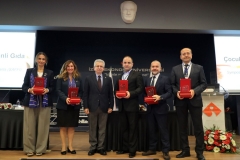
VOCATIONAL SCHOOL OF HEALTH SERVICES
Department of Child Development
CG 211 | Course Introduction and Application Information
| Course Name |
Program Development in Preschool Education
|
|
Code
|
Semester
|
Theory
(hour/week) |
Application/Lab
(hour/week) |
Local Credits
|
ECTS
|
|
CG 211
|
Fall/Spring
|
2
|
0
|
2
|
3
|
| Prerequisites |
None
|
|||||
| Course Language |
Turkish
|
|||||
| Course Type |
Elective
|
|||||
| Course Level |
Short Cycle
|
|||||
| Mode of Delivery | Blended | |||||
| Teaching Methods and Techniques of the Course | Problem SolvingCase StudyPractical demonstrationLecture / Presentation | |||||
| Course Coordinator | ||||||
| Course Lecturer(s) | ||||||
| Assistant(s) | - | |||||
| Course Objectives | The aim of this course is to learn how to analyze applied programs and plans of preschool education institutions, to prepare and implement a plan |
| Learning Outcomes |
The students who succeeded in this course;
|
| Course Description | This course covers basic concepts related to pre-school education program; the general characteristics, objectives and principles of programs applied at preschool educational institutions, planning daily activities which are existing in preschool daily program, prepare daily and annual plan. |
|
|
Core Courses | |
| Major Area Courses |
X
|
|
| Supportive Courses | ||
| Media and Management Skills Courses | ||
| Transferable Skill Courses |
WEEKLY SUBJECTS AND RELATED PREPARATION STUDIES
| Week | Subjects | Related Preparation |
| 1 | Introduction to the course | |
| 2 | The aims and principles of pre-school education | T.C Milli Eğitim Bakanlığı, Temel Eğitim Genel Müdürlüğü, Okul Öncesi Eğitim Programı S. 9-11 |
| 3 | Program development in preschool educationDescription of Education Program for 36-72 Months Children and features | T.C Milli Eğitim Bakanlığı, Temel Eğitim Genel Müdürlüğü, Okul Öncesi Eğitim Programı S. 12-17 |
| 4 | Developmental features, acquirements, indicators and instructions. | T.C Milli Eğitim Bakanlığı, Temel Eğitim Genel Müdürlüğü, Okul Öncesi Eğitim Programı S. 18-36 |
| 5 | Planning and implementation of preschool education | T.C Milli Eğitim Bakanlığı, Temel Eğitim Genel Müdürlüğü, Okul Öncesi Eğitim Programı S. 36-37 |
| 6 | The educational environment and learning centers in preschool education | T.C Milli Eğitim Bakanlığı, Temel Eğitim Genel Müdürlüğü, Okul Öncesi Eğitim Programı S. 37-42 |
| 7 | Activity types and descriptions | T.C Milli Eğitim Bakanlığı, Temel Eğitim Genel Müdürlüğü, Okul Öncesi Eğitim Programı S. 42-49 |
| 8 | Midterm Exam | |
| 9 | Educational plans (monthly plan) | T.C Milli Eğitim Bakanlığı, Temel Eğitim Genel Müdürlüğü, Okul Öncesi Eğitim Programı S. 49-51 |
| 10 | Educational plans (daily plan) | T.C Milli Eğitim Bakanlığı, Temel Eğitim Genel Müdürlüğü, Okul Öncesi Eğitim Programı S. 51-53 |
| 11 | Educational plans (Event plan) | T.C Milli Eğitim Bakanlığı, Temel Eğitim Genel Müdürlüğü, Okul Öncesi Eğitim Programı S. 61-62 |
| 12 | Evaluation of plans and programs in preschool education | T.C Milli Eğitim Bakanlığı, Temel Eğitim Genel Müdürlüğü, Okul Öncesi Eğitim Programı S. 53-56 |
| 13 | The importance of family education in pre-school education | Okul Öncesi Eğitim Programı İle Bütünleştirilmiş Aile Destek Eğitim Rehberi (OBADER)S. 10-15 |
| 14 | School - Family Cooperation in Preschool Education | Okul Öncesi Eğitim Programı İle Bütünleştirilmiş Aile Destek Eğitim Rehberi (OBADER)S. 72-80 |
| 15 | Semester review | |
| 16 | Final Exam |
| Course Notes/Textbooks | Nebiha ÇELİK, Özer DAŞCAN (2019) Okul Öncesi Eğitim Programı ve Etkinlik Kitabı, ANI Yayıncılık, Ankara Prof. Dr Rengin ZEMBAT, Dr. Hilal İlknur TUNÇELİ, Dr. Öğr. Üyesi Ezgi AKŞİN YAVUZ (2019), Erken Çocuklukta Eğitim Programları ve Uygulamalar, ANI Yayıncılık, Ankara |
| Suggested Readings/Materials | Milli Eğitim Bakanlığı, Temel Eğitim Genel Müdürlüğü, Okul Öncesi Eğitim Programı OKUL ÖNCESİ EĞİTİM PROGRAMI İLE BÜTÜNLEŞTİRİLMİŞ AİLE DESTEK EĞİTİM REHBERİ (OBADER) |
EVALUATION SYSTEM
| Semester Activities | Number | Weigthing |
| Participation |
1
|
10
|
| Laboratory / Application | ||
| Field Work | ||
| Quizzes / Studio Critiques | ||
| Portfolio | ||
| Homework / Assignments |
1
|
20
|
| Presentation / Jury | ||
| Project | ||
| Seminar / Workshop | ||
| Oral Exams | ||
| Midterm |
1
|
30
|
| Final Exam |
1
|
40
|
| Total |
| Weighting of Semester Activities on the Final Grade |
3
|
60
|
| Weighting of End-of-Semester Activities on the Final Grade |
1
|
40
|
| Total |
ECTS / WORKLOAD TABLE
| Semester Activities | Number | Duration (Hours) | Workload |
|---|---|---|---|
| Theoretical Course Hours (Including exam week: 16 x total hours) |
16
|
2
|
32
|
| Laboratory / Application Hours (Including exam week: '.16.' x total hours) |
16
|
0
|
|
| Study Hours Out of Class |
14
|
1
|
14
|
| Field Work |
0
|
||
| Quizzes / Studio Critiques |
0
|
||
| Portfolio |
0
|
||
| Homework / Assignments |
3
|
6
|
18
|
| Presentation / Jury |
0
|
||
| Project |
0
|
||
| Seminar / Workshop |
0
|
||
| Oral Exam |
0
|
||
| Midterms |
1
|
12
|
12
|
| Final Exam |
1
|
14
|
14
|
| Total |
90
|
COURSE LEARNING OUTCOMES AND PROGRAM QUALIFICATIONS RELATIONSHIP
|
#
|
Program Competencies/Outcomes |
* Contribution Level
|
||||
|
1
|
2
|
3
|
4
|
5
|
||
| 1 | To have the required contemporary theoretical and practical knowledge in his/her field |
X | ||||
| 2 | To use the material and technology related to his/her field, and make their maintenance, use the information and communication technologies at basic level |
X | ||||
| 3 | To have the competency to recognize the problems in his/her field, analyze them, develop evidence-based solutions and have the ability to share their suggestions with others |
|||||
| 4 | To be aware of legal responsibilities, conduct basic studies in her/his field independently |
|||||
| 5 | To communicate with patients, relatives and colleagues properly, comprehensively, honestly and explicitly, transfer his/her thoughts and knowledge through written and oral communication |
|||||
| 6 | To take responsibility as an active team member during the practices in his/her field |
|||||
| 7 | To commentate and evaluate the scientific information with a critical approach by the help of knowledge gained in his/her field |
|||||
| 8 | To comprehend the importance of lifelong learning, to determine and meet her/his learning needs, to develop herself/himself by monitoring the development in science and technology |
|||||
| 9 | To act by considering the universal ethical values, social and cultural characteristics |
|||||
| 10 | To know the concepts of occupational safety, patient safety, environmental protection and quality, and fulfill the requirements |
|||||
| 11 | To be able to follow information in his field and communicate with colleagues in English at least a level of European Language Portfolio A2 General Level |
|||||
| 12 | To have the skills of improving the development and learning of children with special needs |
|||||
| 13 | To plan and carry out activities for development of people under their responsibility |
X | ||||
*1 Lowest, 2 Low, 3 Average, 4 High, 5 Highest


